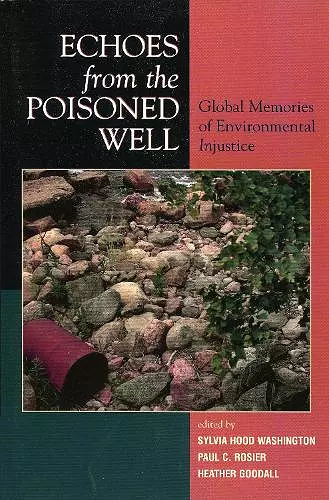Echoes from the Poisoned Well
Global Memories of Environmental Injustice
Sylvia Hood Washington editor Heather Goodall editor Paul Rosier editor
Format:Paperback
Publisher:Bloomsbury Publishing PLC
Published:23rd Feb '06
Currently unavailable, and unfortunately no date known when it will be back

This book explores global environmental justice struggles through the voices of marginalized communities, linking their experiences to broader movements and highlighting shared challenges.
In Echoes from the Poisoned Well, the reader is taken on a profound journey through the historical struggles for environmental justice faced by marginalized communities worldwide. This book stands out in the field of environmental justice historiography by weaving together the authentic voices and memories of those who have endured environmental inequalities. By focusing on these narratives, it highlights the shared experiences of communities across the globe, revealing the interconnectedness of their struggles against environmental injustices.
The emerging environmental justice movement has sparked a greater awareness among scholars about the plight of these communities. The editorial team of Echoes from the Poisoned Well successfully bridges the focused campaigns of African American environmental justice movements with the perspectives of various globally marginalized groups. Drawing on the works of notable scholars like Washington, Paul Rosier, and Heather Goodall, this volume seeks to broaden the discussion around the relationship between memories of injustice and the ongoing demands for environmental justice on a global scale.
This collection of essays represents a significant contribution to environmental historiography, emphasizing 'bottom-up' histories that prioritize the voices of those most affected by environmental degradation. By linking these narratives to a wider context of global activism and education, Echoes from the Poisoned Well opens up new avenues for dialogue and understanding. The chapters reflect an increasing recognition of common ground among diverse struggles and underscore the importance of collaborative strategies in addressing environmental injustices worldwide.
This bold and broad-ranging book presents the pan-global phenomenon of environmental injustice from an historical perspective for the first time. In a volume of well-written and sophisticated analyses, expert authors explore the roots and effects of environmental inequity in societies as different as Finland, Zimbabwe, Australia, Martinique, Taiwan, and the United States. Covering a diversity of urban and rural communities in the developing and developed world, periphery and metropole, indigenous and academic voices are finely balanced. This ambitious collection is innovative in including wide variety and different scales of environmental impacts, including forestry, mining, housing and industrial development, water supply, the effects of pollution and much else. This thought-provoking and instructive book with its interesting mix of perspectives will have wide appeal. -- Professor Jane Carruthers, University of South Africa
For scholars and activists alike, there is no more important task than to connect issues of environmental quality and degradation with the history of power and injustice. By inviting us to connect theory with practice, memory with history, and the local with the global, this volume illuminates the depth, complexity, and urgency of contemporary struggles for environmental justice. These essays help us think our way toward a better understanding of the past, while guiding us toward a more hopeful future. -- Linda Nash, University of Washington
Work on environmental justice is a cutting edge area of scholarship in environmental studies. This edited book contributes to the new genre with its own distinctive take. It combines studies of the African-American environmental justice tradition — the best-known type — with consideration of class and gender issues and highlights research on indigenous peoples. It defines environmental justice broadly to include its basis in dispossession of land. Through a comparative dimension and inclusion of a wide range of essays, the book allows us to move beyond a North American focus to a variety of colonial environments in which indigenous issues can be explored. A timely and thought-provoking collection. -- Ian Tyrrell, University of New South Wales
These moving stories compel us to think about two interrelated questions: Why do societies seem perenially to require necessary victims? And, why have we proven unable to rein in our limitless, even mindless, lust for growth and gain, especially in light of the human costs? Either we heed the Echoes from the Poisoned Well or we will all soon drink its deadly draught. -- Douglas R. Weiner, Professor Emeritus of History, The University of Arizona
This immensely valuable and unprecedented collection demonstrates clearly that decisions to use the environment, and actions that abuse the environment, are too often decisions and actions that use and abuse people. The book ranges energetically across place and time to expose and explore that deeply human side of environmental issues, blending historical perspective with international relevance and sharp local topicality. And it points to the sorts of intellectual and practical capacities needed to deal with environmental injustice. -- Dr. Steve Dovers, Australian National University
ISBN: 9780739114322
Dimensions: 227mm x 200mm x 34mm
Weight: 667g
458 pages